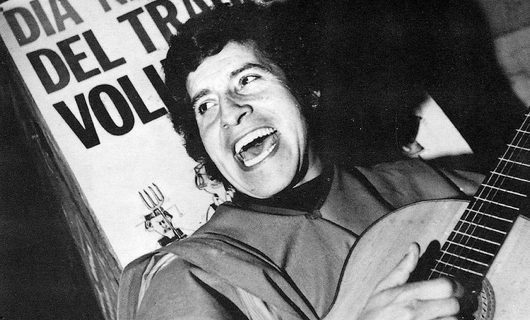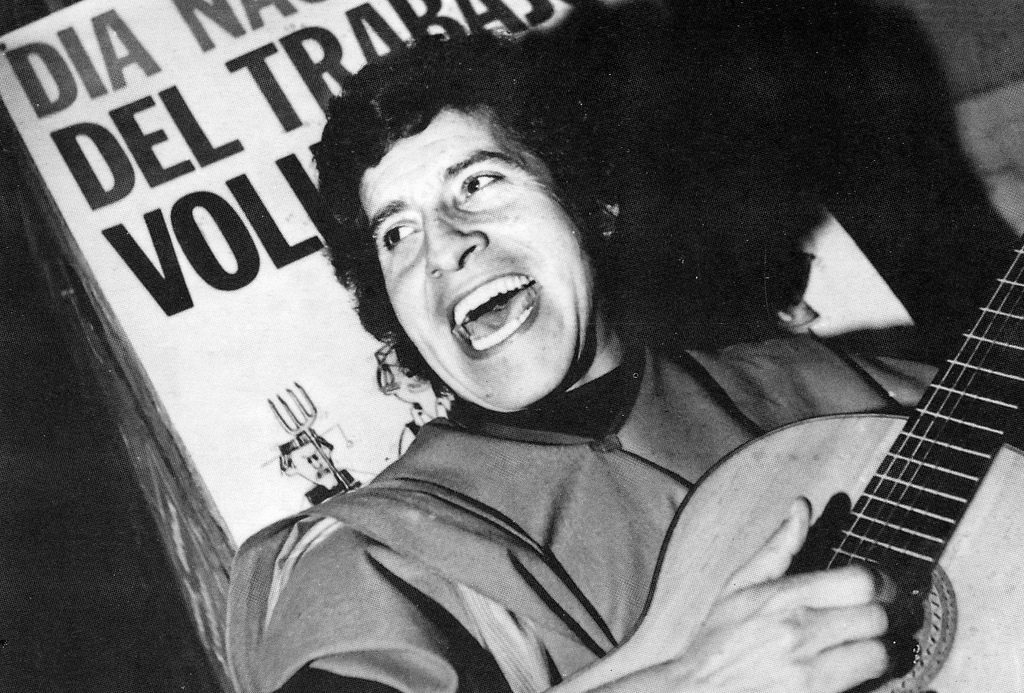
When people think about protest music, they usually think of 1960s folk revival in the United States. In the 1960s and 1970s Chile experienced a similar folk revival which resulted in a genre called nueva canción. Nueva canción took aspects of pre-Colombian folk music from the Andean region of South America and introduced lyrics from the cities. The Musicians, intellectuals and leftists congregated in peñas, or coffee shops, where music and politics melded together.
Chilean nueva canción developed a leftist connotation. As nueva canción drew from the traditions of the countryside, musicians fought to support the rural working class. Indeed, Chilean nueva canción was so politically powerful that it helped to get Salvador Allende elected. Salvador embraced the music so much that his campaign slogan became “you can’t have a revolution without songs.” Unfortunately Augusto Pinochet ousted Allende in a bloody military coup where he tortured, killed, and exiled folk musicians. In this segment of Flashback Friday I want to highlight two key musicians that helped to form nueva canción, Violeta Parra and Victor Jara.
Violeta Parra is credited as the founder of Chilean nueva canción. She was a folk singer, ethnomusicologist and founder of Peña de los Parra, a cafe in Santiago where students, intellectuals and musicians met to perform rural folk songs and share political ideas.The concept of nueva canción, like that of Chilean leftism, was to give a voice to the rural workers in the mines and the farms of the countryside. Parra was a huge player in importing the sentiments of rural life into the city, do to her extensive travels throughout the countryside where she discovered rural folk music. After learning from the campesinos, she returned to Santiago where she fused pastoral rhythms and instruments with urban lyrics. You can hear her unique musical style in one of my favorite recordings, “Que He Sacado Con Quererte” . Here she is playing a bombo drum, a traditional Andean instrument.
Victor Jara took the folk music of nueva canción and gave it an even more distinct political overtone. Jara sang at Peña de los Parra and became involved in Salvador Allende’s presidential campaign. He publicly supported Allende by giving free concerts on his behalf. Unfortunately, during the political coup on September 11, 1973, Victor Jara was arrested and detained at El Estadio in Santiago. He was held with other political prisoners and repeatedly tortured until he was finally shot by a member of the Chilean army. In his final days in Estadio Chile, Jara wrote a song without music about his experience as a prisoner. He handed it to a fellow prisoner shortly before he was taken away. A number of fellow prisoners memorized it to make sure that the song wouldn’t die with Jara.
Estadio Chile
[fusion_builder_container hundred_percent=”yes” overflow=”visible”][fusion_builder_row][fusion_builder_column type=”1_2″]
Somos cinco mil aquí
en esta pequeña parte la ciudad.
Somos cinco mil.
¿Cuántos somos en total
en las ciudades y en todo el país?
Sólo aquí,
diez mil manos que siembran
y hacen andar las fábricas.
Cuánta humanidad
con hambre, frío, pánico, dolor,
presión moral, terror y locura.
Seis de los nuestros se perdieron
en el espacio de las estrellas.
Uno muerto, un golpeado como jamás creí
se podría golpear a un ser humano.
Los otros cuatro quisieron quitarse
todos los temores,
uno saltando al vacío,
otro golpeándose la cabeza contra un muro
pero todos con la mirada fija en la muerte.
¡Qué espanto produce el rostro del fascismo!
Llevan a cabo sus planes con precisión artera
sin importarles nada.
La sangre para ellos son medallas.
La matanza es un acto de heroísmo.
¿Es este el mundo que creaste, Dios mío?
¿Para esto tus siete días de asombro y de trabajo?
En estas cuatro murallas sólo existe un número
que no progresa.
Que lentamente querrá más la muerte.
Pero de pronto me golpea la consciencia
y veo esta marea sin latido
y veo el pulso de las máquinas
y los militares mostrando su rostro de matrona
llena de dulzura.
¿Y México, Cuba y el mundo?
¡Qué griten esta ignominia!
Somos diez mil manos
menos que no producen.
¿Cuántos somos en toda la patria?
La sangre del compañero Presidente
golpea más fuerte que bombas y metrallas.
Así golpeará nuestro puño nuevamente.
Canto, qué mal me sabes
cuando tengo que cantar espanto.
Espanto como el que vivo
como el que muero, espanto.
De verme entre tantos y tantos
momentos de infinito
en que el silencio y el grito
son las metas de este canto.
Lo que veo nunca vi.
Lo que he sentido y lo que siento
harán brotar el momento…
[/fusion_builder_column]
[fusion_builder_column type=”1_2″_last]
There are five thousand of us here
in this small part of the city.
We are five thousand.
I wonder how many we are in all
in the cities and in the whole country?
Here alone
are ten thousand hands which plant seeds
and make the factories run.
How much humanity
exposed to hunger, cold, panic, pain,
moral pressure, terror and insanity?
Six of us were lost
as if into starry space.
One dead, another beaten as I could never have believed
a human being could be beaten.
The other four wanted to end their terror
one jumping into nothingness,
another beating his head against a wall,
but all with the fixed stare of death.
What horror the face of fascism creates!
They carry out their plans with knife-like precision.
Nothing matters to them.
To them, blood equals medals,
slaughter is an act of heroism.
Oh God, is this the world that you created,
for this your seven days of wonder and work?
Within these four walls only a number exists
which does not progress,
which slowly will wish more and more for death.
But suddenly my conscience awakes
and I see that this tide has no heartbeat,
only the pulse of machines
and the military showing their midwives’ faces
full of sweetness.
Let Mexico, Cuba and the world
cry out against this atrocity!
We are ten thousand hands
which can produce nothing.
How many of us in the whole country?
The blood of our President, our compañero,
will strike with more strength than bombs and machine guns!
So will our fist strike again!
How hard it is to sing
when I must sing of horror.
Horror which I am living,
horror which I am dying.
To see myself among so much
and so many moments of infinity
in which silence and screams
are the end of my song.
What I see, I have never seen
What I have felt and what I feel
Will give birth to the moment
[/one_half_last]
While Violeta Parra and Victor Jara are the key players, Chilean nueva canción included countless musicians who risked their personal safety for their music and political beliefs. Nueva canción was an artistic, political and cultural movement and is still recognized in Chile as the pre-colombian folk revival.
[retweet]
[/fusion_builder_column][/fusion_builder_row][/fusion_builder_container]


